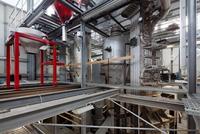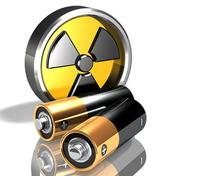-
Obama promotes private-public infrastructure investment plan
President Barack Obama spent Friday afternoon at the Port of Miami where he announced his plan to attract private investment for big infrastructure projects. One such project is a $2 billion upgrading plan for the port. Obama also he would continue his push for a $100 billion infrastructure bank.
-
-
Using waste heat to capture CO2 before it goes up in smoke

Power plants fired by coal and natural gas account for about half of the CO2 that humans add to the atmosphere each year; these power plants are prime candidates for new technology that captures CO2 before it goes up in smoke. Researchers seek to optimize CO2 removal from power plant emissions by employing waste heat. This is just one example of looking to improve upon a tried-and-true technology for CO2 capture. That technology — a two-phase chemical process — has been used for decades to remove naturally occurring CO2 from natural gas.
-
-
U.S. to cut mineral payment to states by $110 million between now and August
The U.S. Department of Interior will cut its federal mineral payments to thirty-five states by $110 million due to the federal budget cuts. Different states will lose different amounts of money: Wyoming tops the list with $53 million in lost federal mineral payments over the next five months, while North Carolina is bringing up the rear, with the federal government cutting its mineral payments to the state by $7 (seven dollars) between now and August.
-
-
U.S. water infrastructure is in a serious state of disrepair
The U.S. water system is in a state of disrepair, and is deteriorating further every year for lack of money for maintenance and upkeep. The results include an estimated 240,000 water main breaks each year and nearly 14,000 dams — or one out of every seven dams — in the United States rated as “high hazard,” meaning that the flush of water from a broken dam would likely kill people.
-
-
Draft cybersecurity bill to increase penalties for hacking substantially
A draft of a cybersecurity bill circulating among House Judiciary Committee members would strengthen a computer hacking law. The draft would stiffen penalties for cyber crimes and establish a standard for companies to tell consumers when their personal information has been hacked. The bill would also change an existing law, making a cyber crime attempt punishable as an actual offense.
-
-
U.K. outlines its long-term nuclear future
Over the next two decades it is forecast that, globally, there will be £930 billion investment in building new reactors and £250 billion in decommissioning those that are coming off line. The nuclear new build program in the United Kingdom alone could generate up to 40,000 jobs in the sector at its peak. Government publishes industrial strategy to enable the UK to seize the opportunities for economic growth in the nuclear industry.
-
-
Coming soon: fuel made directly from CO2 in the atmosphere
Excess carbon dioxide in the Earth’s atmosphere created by burning of fossil fuels is a major driving force of global climate change. Now, researchers have found a way to transform the carbon dioxide trapped in the atmosphere into useful industrial products – including biofuels made directly from the carbon dioxide in the air.
-
-
Fluctuating wind power as a solution rather than a problem
Incorporating wind power into existing power grids is challenging because fluctuating wind speed and direction means turbines generate power inconsistently. Coupled with customers’ varying power demand, many wind-farm managers end up wasting power-generation capacity and limiting the service life of turbines through active control in order to avoid any possible damage to the power grid from spikes in supply.
-
-
Day of the nuclear battery nears

Experts in nuclear physics have helped develop research toward a “nuclear battery,” which could revolutionize the concept of portable power by packing in up to a million times more energy compared to a conventional battery.
-
-
U.S. infrastructure grade raised from D to a D+, but problems loom
The American Society of Civil Engineers (ASCE), in its just-released 2013 Report Card for America’s Infrastructure, gave the U.S. infrastructure an overall grade of D+, showing slight progress from the D in the last Report Card issued in 2009. The Report Card concludes that to raise the grades and get U.S. infrastructure to an acceptable level, a total investment of $3.6 trillion is needed by 2020. Currently, only about $2 trillion in infrastructure spending is projected, leaving a shortfall of approximately $1.6 trillion.
-
-
Improved weather, climate predictions strengthen the U.S. economy
The economic costs of damaging weather events have an immense and increasing impact on the U.S. economy. These costs could be anticipated and mitigated by improved weather and climate predictions, say a range of experts in the public and private sectors. These experts will meet in early April in an American Meteorological Society event to discuss the economic benefits of how environmental forecast, prediction, and observation programs and services strengthen the U.S. economy.
-
-
New technology for carbon-dioxide capture, clean coal reaches milestone

An innovative new process which releases the energy in coal without burning — while capturing carbon dioxide, the major greenhouse gas — has passed a milestone on the route to possible commercial use.
-
-
Instead of a renaissance, U.S. nuclear energy industry is facing tough times
Five years ago, U.S. nuclear industry executives and energy industry analysts talked about an American nuclear renaissance, with up to twenty new reactors to be added to the nation’s stock. Things are very different today, however, and the U.S. nuclear energy industry, rather than expanding, is fighting to hold on.
-
-
NRC rejects plan for Maryland nuclear reactor
A plan to build a third nuclear reactor in southern Maryland was postponed last week as the Nuclear Regulatory Commission (NRC) upheld an earlier decision to squash the project. the primary reason for the rejection is the fact that the applicant’s parent company, Electricite de France, is 85 percent owned by the French government. U.S. law forbids foreign ownership of U.S. nuclear reactors.
-
-
Does warmer climate mean stormier, or only wetter, weather?
Many scientists argue that the climate has warmed since people began to release massive amounts greenhouse gases to the atmosphere during the Industrial Revolution. These scientists, however, are less sure that warming climate creates stormier weather. The reason: nobody has done the quantitative analysis needed to show this is indeed happening. Until now.
-
More headlines
The long view
Helping Strengthen America’s Critical Infrastructure
Everyday life depends on a robust infrastructure network that provides access to running water, communications technology and electricity, among other basic necessities. The experts who keep our national infrastructure secure and resilient also need a strong network to share their knowledge and train the next generation of professionals capable of solving complex infrastructure challenges.
AI and the Future of the U.S. Electric Grid
Despite its age, the U.S. electric grid remains one of the great workhorses of modern life. Whether it can maintain that performance over the next few years may determine how well the U.S. competes in an AI-driven world.
Using Liquid Air for Grid-Scale Energy Storage
New research finds liquid air energy storage could be the lowest-cost option for ensuring a continuous power supply on a future grid dominated by carbon-free but intermittent sources of electricity.
Enhanced Geothermal Systems: A Promising Source of Round-the-Clock Energy
With its capacity to provide 24/7 power, many are warming up to the prospect of geothermal energy. Scientists are currently working to advance human-made reservoirs in Earth’s deep subsurface to stimulate the activity that exists within natural geothermal systems.
Experts Discuss Geothermal Potential
Geothermal energy harnesses the heat from within Earth—the term comes from the Greek words geo (earth) and therme (heat). It is an energy source that has the potential to power all our energy needs for billions of years.
